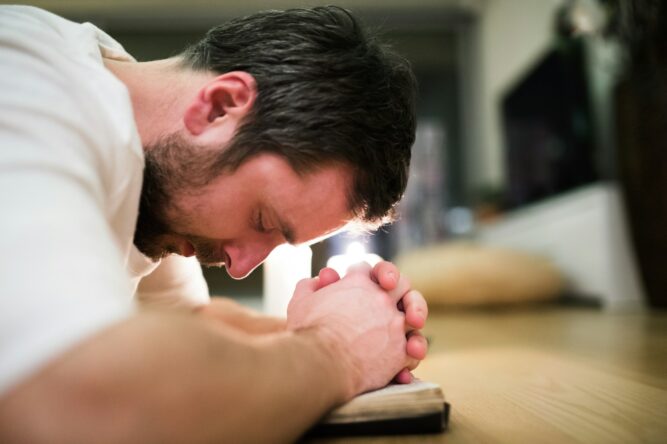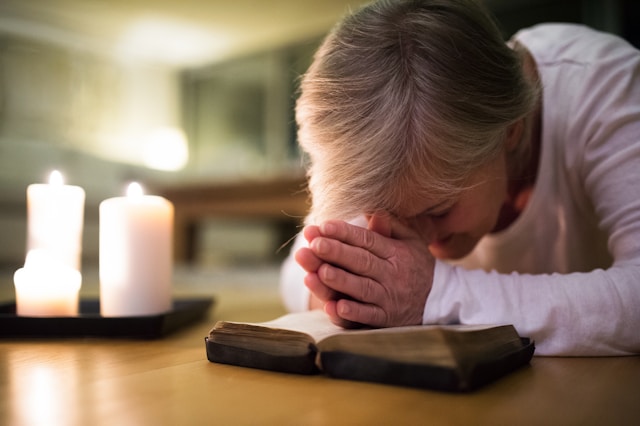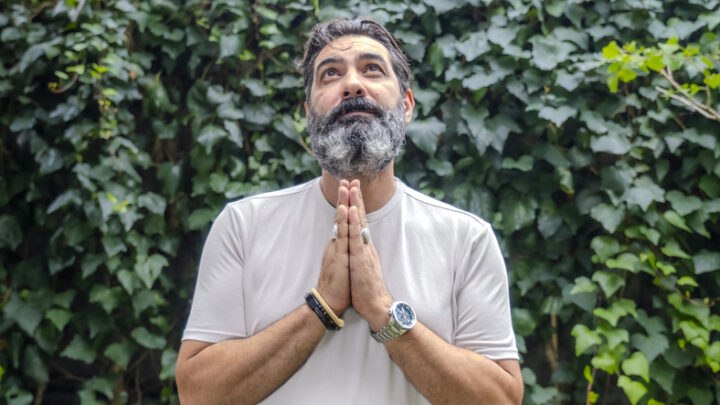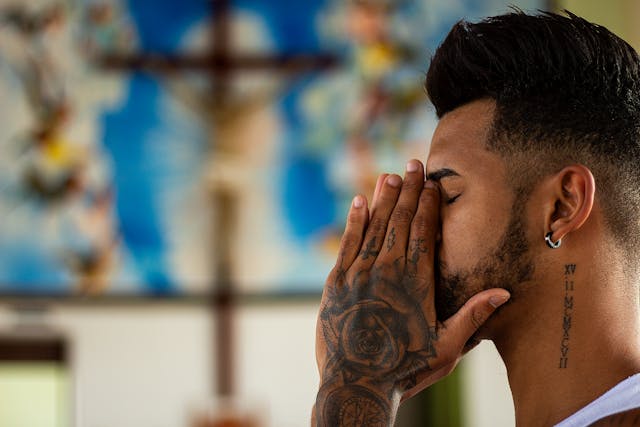Religious trauma bonds can be hard to spot because they often disguise themselves as devotion, faith, or moral responsibility.

When a religious environment uses fear, guilt, or control to keep you emotionally tied to it, the relationship can feel more like an obligation than a choice. You might believe you’re staying out of loyalty, love, or spiritual duty, when in reality, the bond is built on manipulation and emotional dependence. If you’ve ever felt conflicted about your religious experience but struggled to step away, here are some signs you might be in a religious trauma bond without realising it.
1. You feel terrified of questioning your beliefs.

In a healthy faith system, asking questions is encouraged because growth and learning go hand in hand. However, if the idea of questioning your beliefs fills you with fear, shame, or a sense of impending doom, that’s a red flag. When doubt is treated as a betrayal or a sign of weakness, it’s often a tactic to keep people from thinking critically about their faith.
Religious trauma bonds thrive on fear, making you feel like stepping outside the lines could have disastrous consequences. Whether it’s fear of punishment, losing your community, or even divine wrath, this kind of control keeps you emotionally stuck, even when part of you knows something doesn’t feel right.
2. You feel responsible for staying, even if it hurts you.

One of the strongest signs of a trauma bond is the feeling that you must stay, no matter how much it’s hurting you. If your religious upbringing or community has convinced you that leaving would mean abandoning your morals, your family, or even your own salvation, you’re likely trapped in a toxic emotional cycle.
Guilt is often used as a tool to keep people tied to unhealthy systems. If you find yourself staying because you feel obligated rather than because you genuinely believe, it’s worth asking whether your faith is based on true conviction or just deeply ingrained pressure.
3. You constantly feel like you’re never “good enough.”

Religious trauma bonds often rely on a cycle of guilt and redemption that keeps you feeling like you’re always falling short. No matter how much you pray, serve, or follow the rules, you might feel like you’ll never measure up to the standard expected of you. Instead of finding peace in your faith, you feel like you’re constantly trying to earn acceptance.
When religion is used to control rather than uplift, perfection is dangled in front of you like an impossible goal. If you feel like you’re always trying to prove your worth but never quite getting there, it might not be faith — it might be manipulation disguised as spirituality.
4. You experience extreme fear of leaving.

Does the thought of leaving your religious community make you feel panicked, even if you’re deeply unhappy? Fear-based faith systems often create a sense that stepping away would lead to suffering, punishment, or complete isolation. Instead of leaving because it’s the right choice for you, you stay because you’re afraid of what might happen if you don’t.
When love and support are conditional on staying in the faith, it creates an emotional cage. If your community makes it clear that leaving would mean losing their love, acceptance, or even your place in eternity, that’s a trauma bond, not a genuine spiritual connection.
5. You defend harmful teachings or people.

If you find yourself justifying harmful behaviour from religious leaders, institutions, or teachings, that’s a major sign of a trauma bond. You might dismiss abuse, discrimination, or toxic practices as “just part of the faith” or believe that questioning them would mean questioning your entire belief system.
People stuck in religious trauma bonds often develop coping mechanisms to avoid confronting uncomfortable truths. If you’ve ever caught yourself excusing or downplaying harmful things because “that’s just the way it is,” you might be more entangled than you realise.
6. You’ve been taught that suffering is necessary for spiritual growth.

Many toxic religious environments teach that struggling, sacrificing, or even enduring mistreatment is part of being faithful. If you’ve been conditioned to believe that suffering is just part of your spiritual journey and that questioning it is selfish or ungrateful, it’s worth re-evaluating what you’ve been told.
A healthy belief system should provide comfort and guidance, not glorify pain as proof of devotion. If your faith keeps you in harmful situations by convincing you that suffering is a virtue, that’s not spirituality — it’s control.
7. Your identity is completely tied to your religion.

While faith can be a meaningful part of life, it shouldn’t erase your sense of self. If you struggle to separate who you are from what you’ve been told to believe, that’s a warning sign of a trauma bond. You might feel like stepping away would mean losing your entire identity, which keeps you emotionally trapped.
Healthy faith allows room for individuality, personal growth, and self-exploration. If your entire personality and self-worth are wrapped up in religious expectations, it’s time to ask whether you’ve been allowed to fully develop as a person outside of your faith.
8. You feel guilty for thinking about life outside your religion.

Does the idea of exploring different perspectives make you feel ashamed, even if you’re just curious? Many religious trauma bonds rely on the idea that even thinking about alternative beliefs is dangerous. You might feel an internal battle between your natural curiosity and the fear that questioning anything means you’re betraying your faith.
Guilt shouldn’t be the reason you stay in a belief system. If you feel like you can’t even consider new ideas without feeling like a bad person, that’s a sign that fear, not faith, is keeping you in place.
9. You feel emotionally exhausted by your faith.

A meaningful spiritual practice should bring a sense of peace, not constant stress and anxiety. If your religion makes you feel drained, anxious, or like you’re walking on eggshells all the time, that’s a sign something isn’t right. Faith shouldn’t feel like a constant burden.
If your religious experience leaves you feeling more weighed down than uplifted, it’s worth asking whether it’s truly serving you — or if you’re serving it out of obligation, fear, or pressure.
10. You’ve been taught to distrust yourself.

Many people in religious trauma bonds have been told that their own thoughts, feelings, and instincts can’t be trusted. You might have been taught that your desires are sinful, your emotions are unreliable, or that thinking for yourself is dangerous.
When faith requires you to abandon your own judgment and rely entirely on external authority, it strips away your sense of personal agency. A healthy belief system should help you develop wisdom and trust in yourself, not make you feel like you’re always one step away from making a terrible mistake.
11. You suppress emotions to “stay faithful.”

Does your faith community make you feel like certain emotions like anger, doubt, or sadness are signs of weakness or lack of faith? If you’ve learned to suppress your natural emotions out of fear of being judged, that’s a sign of emotional control.
True faith should allow room for your full emotional experience, not force you to shut down parts of yourself to fit in. If your emotions are dismissed as “negative energy” or “temptations,” that’s a sign your religious environment isn’t emotionally safe.
12. You feel like you owe your loyalty, no matter what.

If you’ve been taught that questioning, leaving, or setting boundaries with religious figures is an act of betrayal, you might be stuck in a trauma bond. Loyalty should be earned, not demanded. If your religious experience makes you feel like you have no choice but to stay, that’s a problem.
Faith should be about connection and choice, not obligation. If you feel like you owe your devotion, no matter how much it harms you, ask yourself whether this is truly your belief or something that’s been forced onto you.
13. You keep hoping it will get better, even though it never does.

Religious trauma bonds often operate like toxic relationships — there’s always a promise that if you just do more, pray harder, or “fix” yourself, things will improve. But no matter what you do, the fear, guilt, and emotional exhaustion remain.
If you’ve been stuck in a cycle of hoping things will change but always ending up in the same place, it might be time to step back and evaluate whether your faith is truly supporting you, or if it’s just keeping you stuck.




